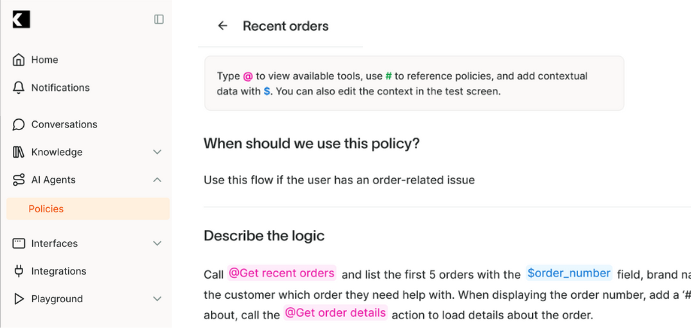Ingredients
Recharge, Freshdesk, and Kodif.
What are AI Policies?

At Kodif, we’re excited to announce the launch of Policies—a powerful, dynamic solution designed to revolutionize the way CX managers handle customer support. Unlike traditional flows, which are rigid and complex, Policies empower non-technical users to create and manage customer interactions with ease. Written in natural language, Policies make it simple to define and refine customer experiences without needing to rely on complicated flowcharts or scripting. This approach is not only user-friendly but also self-serve, enabling CX teams to quickly translate existing Standard Operating Procedures (SOPs) into automation, saving valuable time and resources.
The flexibility of Kodif Policies ensures that businesses can offer personalized, context-driven support while continuously improving customer experiences. With Policies, you can experiment with different strategies to optimize outcomes such as CSAT, revenue, and retention—all without the need to rebuild complex workflows. Whether it’s automating routine interactions or testing new approaches for high-stakes scenarios, Policies provide a scalable, adaptable solution that aligns with your business goals. While flows still have their place in sensitive, high-risk situations, Policies offer an agile alternative that helps businesses innovate faster and deliver exceptional, tailored experiences at scale.
“Skip next shipment” ticket type explained
In customer support, a “Skip next shipment” ticket type addresses customer requests to bypass an upcoming delivery. This often occurs in subscription-based services where customers may want to pause their shipments temporarily due to various reasons, such as having surplus stock, being away from home, or financial constraints. Efficient handling of these requests can significantly enhance customer satisfaction, as it demonstrates flexibility and understanding of customer needs. Automation through AI policies helps streamline these processes, reducing manual intervention and ensuring prompt and accurate responses to customer requests.
Which Platforms does this AI policy work on?
This AI policy works seamlessly on Recharge, Freshdesk, and Kodif. Kodif integrates with all other major platforms, offering a comprehensive solution for diverse customer support needs.
When should I use this policy?
This policy should be used when a customer reports that they have not received their shipment despite the order being marked as delivered or expected.
Policy Logic
- Ask for the user’s email address:
- Use
@get_recharge_account_details(email: str)tool to check if a user with that email address exists in Recharge. -
Ask for the order number of the shipment in question.
-
Retrieve and Verify Order Details:
- Use
@recharge_order_details(order_id: str)to fetch the order details. - Confirm the shipping status (e.g., “Delivered,” “In Transit,” “Out for Delivery”).
-
If the status is “Delivered,” verify the delivery date and address.
-
Check Tracking Information:
- Use
@get_tracking_infoto review the shipment’s tracking details. - Confirm if the carrier has marked the shipment as delivered.
-
Note any discrepancies (e.g., tracking stopped updating, incorrect delivery address).
-
Gather Additional Details from the Customer:
- Ask the customer to confirm if they’ve checked with household members or neighbors.
- Ask if the carrier left a notice or placed the shipment in a designated area (e.g., mailbox, porch).
-
Request the customer to confirm that they have not received the shipment despite these checks.
-
If Tracking Confirms Delivery:
- Inform the customer that the shipment is marked as delivered but offer to investigate further.
- Open a claim with the carrier using
@file_carrier_claim(order_id: str). -
Notify the customer that you will follow up once the claim is resolved.
-
If Tracking Shows No Delivery:
- Inform the customer that the shipment appears lost in transit.
-
Offer a resolution:
- Reship the order using
- Issue a refund
-
If the user selects the reship option:
-
Go to
#Reshipment Policy -
If the user selects the refund option:
- Go to
#Refund Policy
Example Policy
Use this policy when a customer reports that they have not received their shipment despite the order being marked as delivered or expected.
Policy Logic
- Ask for the user’s email address:
- Use
@get_recharge_account_details(email: str)tool to check if a user with that email address exists in Recharge. -
Ask for the order number of the shipment in question.
-
Retrieve and Verify Order Details:
- Use
@recharge_order_details(order_id: str)to fetch the order details. - Confirm the shipping status (e.g., “Delivered,” “In Transit,” “Out for Delivery”).
-
If the status is “Delivered,” verify the delivery date and address.
-
Check Tracking Information:
- Use
@get_tracking_infoto review the shipment’s tracking details. - Confirm if the carrier has marked the shipment as delivered.
-
Note any discrepancies (e.g., tracking stopped updating, incorrect delivery address).
-
Gather Additional Details from the Customer:
- Ask the customer to confirm if they’ve checked with household members or neighbors.
- Ask if the carrier left a notice or placed the shipment in a designated area (e.g., mailbox, porch).
-
Request the customer to confirm that they have not received the shipment despite these checks.
-
If Tracking Confirms Delivery:
- Inform the customer that the shipment is marked as delivered but offer to investigate further.
- Open a claim with the carrier using
@file_carrier_claim(order_id: str). -
Notify the customer that you will follow up once the claim is resolved.
-
If Tracking Shows No Delivery:
- Inform the customer that the shipment appears lost in transit.
-
Offer a resolution:
- Reship the order using
- Issue a refund
-
If the user selects the reship option:
-
Go to
#Reshipment Policy -
If the user selects the refund option:
- Go to
#Refund Policy









